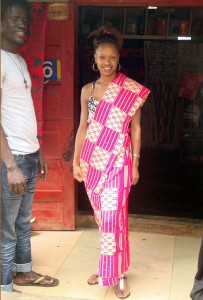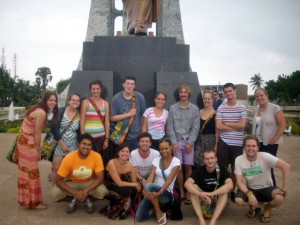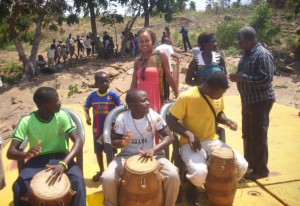
The signs had been there for several years that Justelle Cain would go to Africa one day. They were subtle at first: a conversation about a friend’s trip to Morocco that piqued Cain’s interest in the continent that, at the time, wasn’t even on her radar; then a cultural pluralism course on African and American culture that made her think more about her own African heritage.
It all came to a head, though, for the senior psychology major last spring – and now, a year later, she’s talking about her experiences studying abroad in Ghana over the fall 2011 semester. She will give a talk “An African American in Africa” (postponed from last week) on Monday, Feb. 27, from 1 to 2 p.m. in meeting room 324/325 on the third floor of Loker Student Union.
In February 2011, Cain was in a clinical psychology class learning about cultural sensitivity and how others’ cultures shape their experiences. In a video shown one day in class, an African American professor being interviewed made a statement, which maybe at a different point in her life wouldn’t have struck such a cord, but at that moment affected Cain deeply.
“He said in order for African Americans to become successful doctors, it’s extremely important that they know their culture… and I got chills and was literally fighting back the tears because it was in that moment that I knew it was time for me to go to Africa,” she said. “So that day, after I left class, I [went] to admissions, and I filled out the slip and basically postponed my graduation for a year.”
Cain then walked over to the International Education Center (IEC) on campus and told IEC program assistant Racheal Wangui she was ready to go to Ghana. IEC helps students coordinate studies in foreign countries through the CSU International Programs, which offers yearlong study abroad choices at more than 50 universities in 18 countries, or the University Study Abroad Consortium (USAC), a University of Nevada-based program that offers semester, summer, or yearlong study abroad at over 700 universities either nationwide or in one of 24 countries. Within a week, Cain had submitted the paperwork for USAC study in Ghana, and even applied for the Gilman International Program Scholarship, which she was later awarded.

Students choose to do study abroad for many reasons: to gain new experiences, meet new people, or envelope themselves in a new culture. For Cain it went beyond that– even beyond the professional aspect raised in that psychology class video. It was much more personal, and was, in many ways, directly tied to changes she’d been making in her life for the last several years.
Cain is what one would call a “non-traditional” student. At the age of 36, out of a job and wanting to do something more with her life, she made the decision to turn her true passion of helping people understand themselves better through astrological readings into a degree in psychology with the goal of becoming a professional counselor.
“One of the biggest things I want to do is help people in my community because it is not OK for me to be doing well and my family to be doing well if my community is still struggling,” said Cain, now 39. “It had everything to do with the struggle that made me want to [go into psychology, and discover her roots], and not only the struggle that we went through to be freed as slaves but just looking at the condition that African Americans are in today. That had a lot to do with it. In order to understand where you are today you have to look to the past.
“Part of me wanting to go to Africa was based on my own ignorance; I’d heard so many myths about what Africa was, what Africa wasn’t,” Cain continues. “So basically I felt disconnected and I wanted to see if there was a connection, and there was. I kept saying going to Africa that I’m going back, as if I’d been there before. And I’d never been to Africa before, but I felt like I was going home. And when I got to Africa, I did, I felt at home.”
She immersed herself into her experience there, enrolling not just in classes in her major, but in all African studies courses: government, history, ethics and religion, and Twi, one of the traditional Ghanaian languages, at the host university, the University of Ghana, Legon.
“I did not learn as much Twi as I would have like to, but I still had fun trying to learn the language,” she said. “The classes I enjoyed most were government and history, because they gave me insight into why Africa is in the condition it is in today, both politically and economically, and what Africans were like before they were Americans. For the first time I was able to see why ‘African’ Americans are the way they we are.”
While the classes provided insights, it was outside the classroom, through her travels, where she truly learned about Ghana and Africa. She visited Kumasi in central Ghana, the coastal towns of Axim, Ada, Tema, and in western Ghana, the historic stilt settlement of Nzulezu, the remote Dodi Island, and Ho. Of the many sights she saw, Elmina Castle, the first slave-trading post in Africa, was the most memorable, Cain said.
“I thought that I would be sad and upset, or even filled with rage, after hearing about the horrendous experiences my ancestor endured, but instead I felt a sense of calm and an overwhelming peace as I walked through the ‘Doors of No Return,'” she said. “All I could think was and’ they thought we’d never return.'”
Ghana was definitely a different world from Southern California, where Cain has lived all her life, and Cain said she did experience culture shock. Showers were cold; electricity often went out, making Internet connections tenuous; it wasn’t uncommon to see chickens, goats and other animals roaming the streets; customer service was lacking; and Cain said Ghanaians tended to stare as their way of trying to figure you out. Poverty was also very wide-spread, particularly among women, who are seen as second-class citizens in the still very patriarchal society. Cain said that as a strong-willed African-American woman, she sometimes had to bite her tongue. In contrast, Cain also remarked on the country’s beauty, the delicious food (something she really misses now back in the States) and the welcoming nature of its people.
Being an African American in Africa evoked a number of mixed emotions in Cain, she said. She may have felt a strong tie to Africa, but she came to realize her foreign-ness, too. Compared to Africans, she talks differently, dresses differently, holds herself differently, and has had different life experiences.

“I am an American, but I identify with my African roots. I had this conversation with myself, because I went over there open minded, open to the experience, but … at the end of the day, I’m an American,” she said, “and I was angry when I had that conversation with myself, because, I thought ‘they look at me different, they stare at me, they call me black American, they don’t accept us.’ And that wasn’t true. It’s just different.”
She considers her time in Africa as life-changing, and encourages students to consider studying abroad. Her advice:
“Don’t go over there looking for an American experience, because you’re just going to get your feelings hurt. And there were some people who two months into the trip wanted to come home. And I think they went over there with the wrong attitude. When you have four months to be some where you better adapt quick, otherwise it’s going to be a miserable trip.”
She especially encourages African American students to visit Africa if they have the opportunity.
“Just go. Just trace your roots. Because I think the biggest problems with African Americans and Africans in the Diaspora is we’ve lost our connection to Africa. To me I don’t think you can be completely whole until you fill that gap,” she said.
Cain will graduate in May, and plans to pursue a master’s and eventually a Ph.D. in psychology, but before that, she may follow a new set of signs telling her to go into the Peace Corps.
Applications are still being accepted for some of the study aboard locations for summer and next semester. Contact the International Education Center at (310) 243-3919 or iec@csudh.edu, or visit the IEC office in the Small College Complex, SCC 136A.
There will be a study aboard informational meeting on Tuesday, March 6, from 11 a.m. to noon in room 1210 in the Extended Education building. On March 13, IEC is hosting the CSUDH Study Abroad Fair from 10 a.m. to 2 p.m. in the Loker Student Union Ballroom C.
As part of Black History Month, Dateline Dominguez is profiling a few of the accomplishments and contributions of African American students, faculty, alumni, and academic departments, as well as special events marking the month on campus. For more Black History Month 2012 coverage, go here.